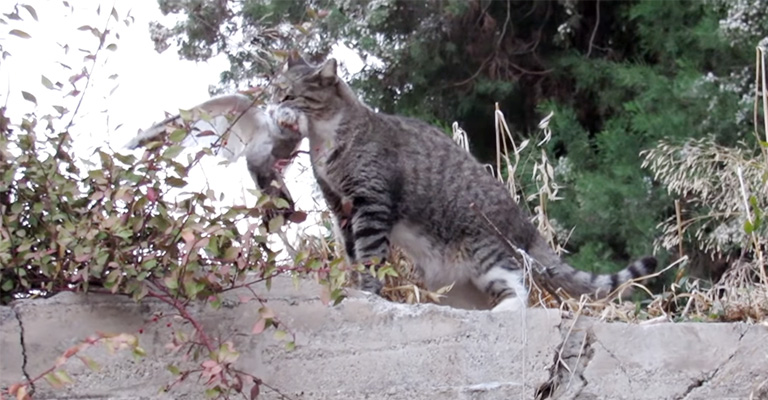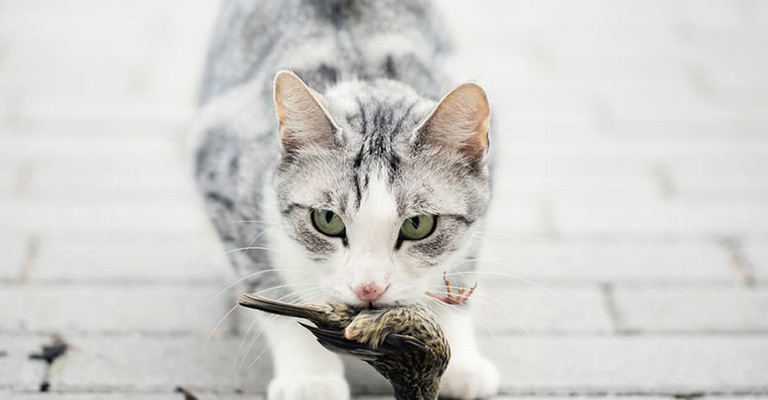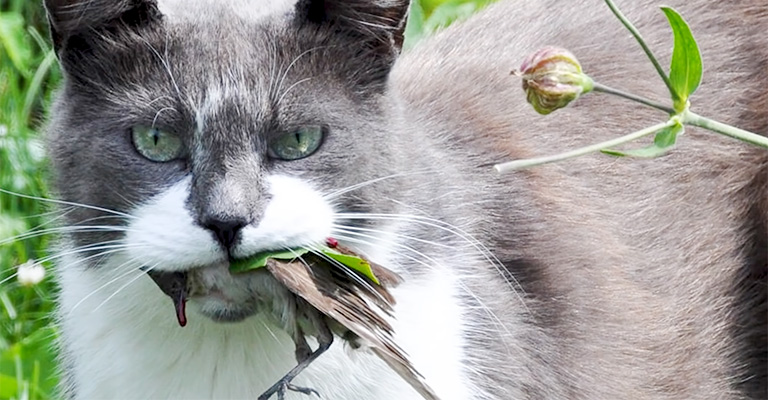The predation of birds by domestic and feral cats has long been a subject of concern and discussion in the United Kingdom.
As a nation of cat lovers, the presence of millions of feline companions across the UK has undoubtedly left its mark on the local bird populations. This complex issue has raised questions about the scale of the problem and its potential impact on wildlife conservation efforts.
Estimating how many birds cats kill in the UK is a challenging task due to various factors, including regional variations, seasonal patterns, and the distinction between domestic and feral cats.
In this exploration, we delve into How Many Birds Do Cats Kill in the UK.
While cats’ hunting instincts are natural and hard to eliminate entirely, understanding the scope of the issue is crucial for finding a balance between pet ownership and bird conservation in the UK.

How Many Birds Do Cats Kill in the UK?
The number of birds killed by cats in the UK can vary from year to year and across different regions.
It’s important to note that these estimates are not precise, and various factors can influence the numbers.
Here are nine data points, along with brief descriptions:
- Cats kill more than 25 million birds each year in the UK. This is the number of birds that are known to have been caught by cats, but the actual figure could be much higher as it does not include birds that are injured or not brought home by cats.
- The average pet cat brings home five kills a year. Cats may bring home their prey to a safe and secure place or share it with their owners as a present. However, this represents only a fraction of the animals that cats kill each year.
- The average cat kills between 15 and 34 animals each year. This includes small mammals, rodents, and birds. Cats are natural predators and hunt for various reasons, such as instinct, boredom, or hunger.
- There are 10.8 million pet cats in the UK. Cats are one of the most popular pets in the country, with around 26% of households owning at least one cat. However, not all cats are kept indoors, and many are allowed to roam freely and hunt wildlife.
- There are a quarter of a million stray and feral cats in the UK. These are cats that have no owners or have been abandoned or lost. They live in colonies and survive by scavenging and hunting.
They may pose a bigger threat to birds than pet cats, as they have to rely on their hunting skills more.
- Only 26% of the UK’s cats are kept as indoor cats. This means that most cats have access to the outdoors and can potentially hunt birds and other animals.
Some owners may prefer to let their cats enjoy the natural environment, while others may not be aware of the impact of their cats on wildlife.
- There are more than 170 million birds in the UK. This is an estimate based on the breeding populations of different bird species.
However, some bird populations have declined significantly over the years due to various factors, such as habitat loss, climate change, disease, and predation. - Sparrows, bluetits, blackbirds, and starlings are the species most often killed by cats. These are some of the most common garden birds in the UK, and they may be more vulnerable to cat attacks because they feed on the ground or near bushes.
They also tend to nest in low places, such as hedges or boxes, where cats can easily reach them.
Estimating the exact number of birds killed by cats in the UK is challenging due to various factors, including regional variations, the distinction between domestic and feral cats, and seasonal patterns.
While cats do contribute to bird mortality, addressing this issue requires a multifaceted approach, including responsible pet ownership and broader conservation efforts aimed at preserving bird habitats and addressing other threats to avian populations.
Why Birds Do Cats Kill in the UK?

There are many possible reasons why cats kill birds in the UK.
Here are some of them, based on the web search results:
Instinct
Cats are natural predators and have an innate drive to hunt and chase prey, even if they are well-fed and cared for. Hunting is also a form of play and stimulation for cats, and they may kill birds out of curiosity or boredom.
Territory
Cats may kill birds to defend their territory from intruders or competitors, such as other cats or wildlife. Cats may also mark their territory by leaving their kills as a sign of dominance or ownership.
Hunger
Cats may kill birds to satisfy their hunger, especially if they are stray, feral, or have limited access to food. Cts may also prefer fresh meat over processed cat food and may hunt birds as a supplement to their diet.
Training
Cats may kill birds to practice their hunting skills and improve their chances of survival in the wild. Kittens may learn to hunt from their mothers or other cats and may kill birds as a way of honing their abilities.
Gift
Cats may kill birds to share them with their owners or other cats as a present or a sign of affection. Cats may also bring home their kills to a safe and secure place, where they can eat them or store them for later.
Sport
Cats may kill birds for fun or entertainment, without any intention of eating them or bringing them home. Cats may enjoy the thrill of the chase and the challenge of catching a moving target and may kill birds as a form of recreation.
Population
Cats may kill birds because there are too many cats and not enough prey in the UK.
The UK has an estimated 10.8 million pet cats and millions more stray and feral cats, which puts pressure on wildlife and reduces the availability of food sources for cats.
Habitat:
Cats may kill birds because there is not enough suitable habitat for birds in the UK.
The loss and fragmentation of natural habitats, such as woodlands, grasslands, and wetlands, due to human activities, such as agriculture, urbanization, and climate change, have reduced the diversity and abundance of bird species and made them more vulnerable to predation by cats.
Protection:
Cats may kill birds to protect themselves or their kittens from potential threats or predators, such as hawks, owls, foxes, or dogs.
Cats may also perceive birds as rivals or enemies and may attack them to eliminate them or deter them from approaching their territory.
How Do I Stop My Cat From Killing Birds?

If you’re concerned about your cat’s impact on local bird populations and want to reduce their hunting behavior, here are some tips, each with a description:
Keep Your Cat Indoors
One of the most effective ways to prevent your cat from killing birds is to keep them indoors. This eliminates their access to potential prey and keeps both your cat and local wildlife safe.
Supervised Outdoor Tim
If you want your cat to enjoy the outdoors, consider supervised outdoor playtime using a leash and harness. This way, your cat can experience the outside world without posing a threat to birds.
Install Catios or Enclosures
Catios are enclosed outdoor spaces designed specifically for cats. They provide a safe environment for your cat to enjoy fresh air without harming birds.
Use Bells on Collars
Attach a bell to your cat’s collar. Although not foolproof, bells can provide some warning to birds, making it more difficult for your cat to sneak up on them.
Provide Entertainment
Engage your cat in interactive play with toys that mimic hunting behavior. This can help satisfy their natural instincts and reduce their need to hunt birds.
Bird-Proof Your Yard
Make your yard less appealing to birds by using deterrents like bird netting, motion-activated sprinklers, or reflective objects that birds find unsettling.
Feeding Stations
Encourage birds to visit designated feeding stations away from areas your cat frequents. This can help minimize encounters between your cat and local birds.
Spay/Neuter Your Cat
Spaying or neutering your cat can reduce their territorial instincts and potentially curb their hunting behavior.
Consult a Veterinarian
If your cat’s hunting behavior is excessive or causing harm, consult with a veterinarian or animal behaviorist. They can provide personalized advice and, if necessary, recommend behavioral interventions or medications.
It’s essential to remember that cats have natural hunting instincts, and completely eliminating their desire to hunt may not be possible.
However, by implementing these tips, you can minimize the impact your cat has on local bird populations while still providing them with a safe and enriched environment.
FAQ
Estimations suggest that cats in the UK are responsible for the deaths of millions of birds each year, with numbers varying by region and other factors.
No, the majority of bird predation is attributed to feral cats and those with outdoor access. Indoor cats have a significantly lower impact on bird populations.
Yes, even well-fed domestic cats can exhibit hunting behavior and contribute to bird deaths, particularly during the breeding season.
Yes, measures include keeping cats indoors, supervised outdoor time with a leash, and using collars with bells to warn birds of a cat’s presence.
Striking a balance involves responsible pet ownership, bird-friendly yard designs, and supporting conservation efforts to protect both birds and cats while maintaining their respective roles in our lives and ecosystems.
Conclusion
The question of how many birds cats kill in the UK underscores the delicate balance between our affection for feline companions and our responsibility to protect local wildlife.
The data, though not precise, indicates that cats do pose a threat to bird populations, with millions of birds falling victim to their hunting instincts annually.
However, it is essential to contextualize these numbers within the broader spectrum of factors affecting bird populations, such as habitat loss and climate change.
Mitigating the impact of cat predation on birds requires a multi-faceted approach. This includes responsible pet ownership, such as keeping cats indoors or supervised during vulnerable times, supporting trap-neuter-return programs for feral cats, and promoting the use of deterrents like collars with bells.
Conservation organizations, pet owners, and policymakers must work together to strike a balance that allows both cats and birds to coexist in the UK’s diverse ecosystems.